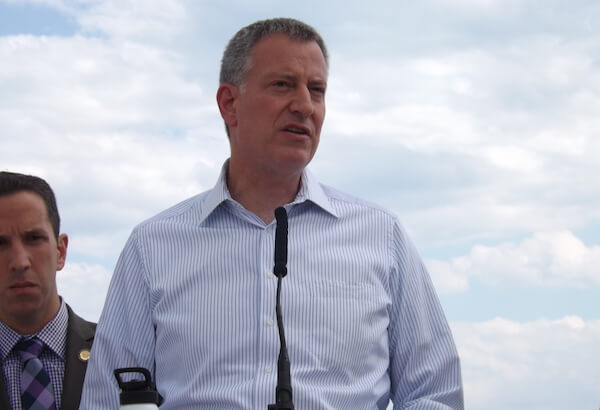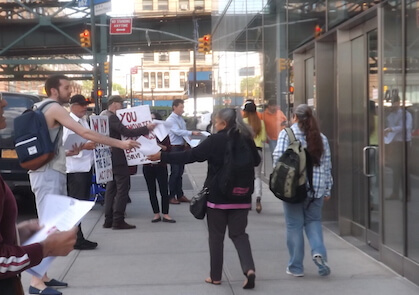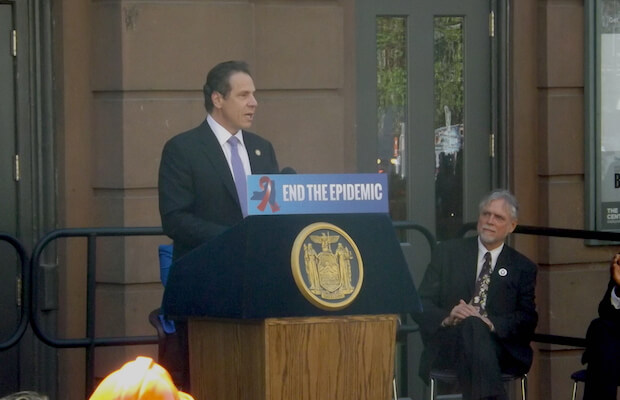Former Congressman Anthony Weiner employs his customary campaign practice of standing up to answer questions at forums. | DONNA ACETO
A mayoral forum on AIDS issues was lent a circus-like atmosphere as revelations that Anthony Weiner, one of six candidates for the Democratic nomination for mayor, continued sending sexy text messages and nude selfies after that practice forced him to resign from Congress in 2011.
“If you want someone who’s going to check the right boxes then vote for anyone,” Weiner said at the start of the July 23 forum and added with unintended irony, “If you want someone who’s going to shake things up then I’m your candidate.”
A website, The Dirty, reported that day that it had obtained text messages and nude selfies Weiner sent to a woman who was not named in the story. That relationship continued through mid-2012, the website reported.
The forum, which was held at the West 33rd Street headquarters of Gay Men’s Health Crisis, was before a crowd of over 100 in a seventh floor dining room, with additional audience members seated in an overflow room on the sixth floor.
Mayoral hopefuls appear before more than 100 at GMHC debate stalled by gossip hungry press
The forum was sponsored by three dozen gay and AIDS groups, but was delayed by nearly 40 minutes as Weiner held a separate press conference in GMHC’s offices before a mob of local and entertainment media, such as “Inside Edition,” a TV gossip show. Some members of the media expected Weiner to withdraw from the race.
Some paparazzi were also on hand for both events. Those photographers began to hover near the front of the room as the 90-minute forum neared its end. As it happened, Weiner was the last candidate to speak and the paparazzi swooped in near him to get photographs as he stood for his closing statement. When he finished, Weiner was engulfed in a crowd of photographers and journalists who followed him out of the room.
Members of ACT UP demonstrated outside the forum demanding widespread access to post-exposure prophylaxis for those seeking immediate treatment after a risky sexual encounter. | DONNA ACETO
As the forum opened, Sal Albanese, who represented a Brooklyn City Council district from 1983 to 1998, expressed frustration with the “latest psychodrama involving Mr. Weiner.”
The other candidates, some of whom had suggested in earlier press reports that Weiner should quit the race, remained mum during the forum on the most recent Weiner shenanigans. GMHC invited Randy Credico to join its panel of seven candidates. The comedian and activist only added to the theatrics.
“I tried cocaine for 25 years, I didn’t like it,” Credico said early in the forum. Referring to Weiner, he added, “His scandals are nothing.”
City Council Speaker Christine Quinn, an out lesbian who represents Chelsea and the West Village, was with her ailing elderly father and did not attend the forum.
“I think that we do know her track record,” Janet Weinberg, GMHC’s chief operating officer, told the crowd at the start of the forum when announcing that Quinn would not be there.
The agency, which has received millions in city contracts and City Council discretionary funds, is a Quinn booster and there are certainly those in the community who argue that the boosterism is deserved.
Seven GMHC staffers, including Weinberg and Marjorie Hill, GMHC’s current chief executive officer, have donated a total of $1,625 to her campaigns for City Council and now the Democratic nomination for mayor since 2007.
The forum was a mix of substance and the insubstantial with an audience that was not at all shy about expressing its approval or disapproval of the answers the candidates offered.
Asked how they would select members of New York City advisory bodies, such as the one that decides how the city should spend the roughly $100 million in AIDS funds it receives annually from the federal government, all the candidates said they would consult with community groups. When Bill Thompson, the former city comptroller, suggested he would put Hill on the AIDS advisory board that drew a chorus of loud boos.
Hill, who has headed the AIDS agency since 2006, started a paid leave on July 1 and will return on October 1. Two senior GMHC staffers said that reports that Hill would leave GMHC after the three months of paid leave were incorrect.
The forum’s most serious issue was a proposed 30-percent rent cap for people with AIDS receiving public assistance. Dating back at least to 2006, advocates have tried to close an anomaly in housing aid to certain clients of the city’s HIV/ AIDS Services Administration, by providing sufficient support so that their out-of-pocket rents are no more than 30 percent of their monthly income. Such a cap already exists for tenants in public and congregate care housing — but not to those in the private rental market. Applying the cap uniformly requires action from the State Legislature and the Bloomberg administration has successfully fought that change.
“We don’t elect a mayor to turn away from those most in need,” said Bill de Blasio, the city’s public advocate. John Liu, the city’s comptroller, agreed.
Adolfo Carrión, the former Bronx borough president and City Council member, said it was time “to get Albany off our back,” though he had earlier warned the crowd to “beware of the theatrics” of the other candidates.
“I think what you’re looking for in a leader is somebody who understands the seriousness of these issues,” said Carrión who is running on the Independence Party line. “In a Carrión administration, the services to this community will be of the highest order.”
The forum was moderated by Oriol Gutierrez, the editor of POZ magazine. Gay City News was among the event’s sponsoring organizations.




































